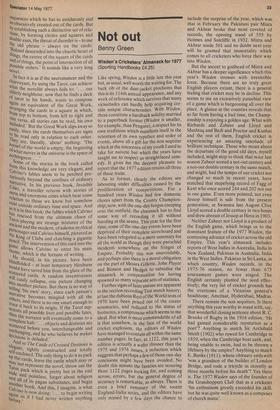Not out
Benny Green
Wisden's Cricketers' AlMarlaCk for 1977 (Sporting Handbooks .£4.25) Like spring, Wisden is a little late this year but, as usual, well worth the waiting for. The back rib of the dust-jacket proclaims that this is its 114th annual appearance, and any work of reference which survives that many vicissitudes can hardly help acquiring certain unique characteristics. With Wisden; these constitute a hardback solidity married to a paperback format (Wisden is smaller, for example, than Penguin), a respect for its own traditions which manifests itself in the retention of its own typeface and order of events, above all a gift for the non sequitur which in the innocence of my youth I used to take for naivete but which the years have taught me to respect as straightfaced comedy. It gives ine the deepest pleasure to report that the 1977 edition retains all three of these traits.
As to format, clearly the editors are labouring under difficulties caused by the proliferation of competitions. For a hundred years Wisden had few domestic chores apart from the County Championship; now, with the one-day fungus creeping over the outfield, the almanack has to find some way of recording it all without bursting at the seams. This year for the first time, some of the one-day events have been deprived of their complete scoreboard and have been relegated to a mere summary for. all the world as though they were parochial incidents somewhere on the fringes of Empire. Probably this was unavoidable, and perhaps also there is a moral obligation on the part of Messrs Gillette, John Player and Benson and Hedges to subsidise the almanack in compensation for having spawned so many separate sets of statistics. Further signs of faint unease are apparent in the section recording Test match history; at last the dubious Rest of the World tests of 1970 have been prised out of the career summaries, and reduced to the status of footnotes, a compromise which seems to me ideal. But what is most commendable of all is that somehow, in the face of the world cricket explosion, the editors of Wisden have managed to contain all within the same number pages. In fact, at 1122, this year's edition is actually a wafer thinner than the 1975 and 1976 issues, a reduction which suggests that perhaps a few of those one-day concisions might have been avoided. No doubt this minute the fanatics are scouring those 1122 pages looking for, and coming across, errors, but the general degree of accuracy is remarkable, as always. There is even a brief summary of the recent England-India series, and the editors have only missed by a few days the chance to include the surprise of the year, which was that in February the Pakistani pair Mizra and Akhtar broke that most coveted of records, the opening stand of 555 by Holmes and Sutcliffe in 1932. Mizra and Akhtar made 561 and no doubt next year will be granted that immortality which comes to all cricketers who force their way into Wisden.
But the ascent to godhead of Mizra and Akhtar has a deeper significance which this year's Wisden stresses with irresistible force. Because there are no truly great English players extant, there is a general feeling that cricket may be in decline. This seems to me an excessively parochial view of a game which is burgeoning all over the place. A glance at the counties reveals that so far from having a bad time, the Championship is enjoying a golden age. What with Richards and Zaheer and Lloyd and Mushtaq and Bedi and Proctor and Kanhai and the rest of them, English cricket is experiencing an amazing interlude of brilliant technique. Those who moan about the departure of the good old days, myself included, might stop to think that twice last season Zaheer scored a not-out century and a not-out double century in the same match, and might, had the tempo of our cricket not changed so much in recent years, have matched that stupefying record of Fagg of Kent who once scored 244 and 202 not out in one game. Even more pointed, not even Jessop himself is safe from the present generation; at Swansea last August Clive Lloyd scored a double century in two hours and drew abreast ofJessop at Hove in 1903.
Neither Zaheer nor Lloyd is a product of the English game, which brings us to the dominant feature of the 1977 Wisden, the continuing advance of cricket across the old Empire. This year's almanack includes reports of West Indies in Australia, India in New Zealand, Pakistan in Australia, India in the West Indies. Pakistan in Sri Lanka, in which country, Wisden records, in the 1975-76 season, no fewer than 675 tournament games were staged. The English certainly planted the seed effectively; the very list of cricket grounds has the overtones of a Victorian general's headstone; Amritsar, Hyderabad, Madras.
There remain the non sequiturs. Is there anything this year worthy to stand with, say, that wonderful closing sentence about R. C. Brooke of Rugby in the 1916 edition. `He had gained considerable reputation as a poet'? Anything to match Sir Archibald Smith (1902) who rowed for Cambridge in 1859, when the Cambridge boat sank, and, being unable to swim, had to be thrown a lifebuoy by the umpire? Anything to match • E. Banks (1911), whose obituary ends with `was a grandson of the builder of London Bridge, and rode a tricycle as recently as three months before his death'? Yes there
is. The 1977 Wisden says of the founder of the Grasshoppers Club that as a cricketer
`his enthusiasm greatly exceeded his skill, but he was quite well known as a composer of church music'.


































 Previous page
Previous page